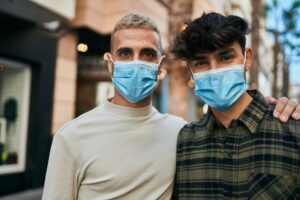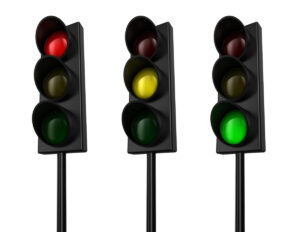With a few weeks into the new year, I’ve been talking with a lot of my clients about their goals for 2021. I have often done this with clients at the start of a new year throughout my long career (29 years) as a gay men’s specialist therapist and coach, but this year is so very different. With the context of the COVID-19/coronavirus pandemic, everything has changed so much from just one year ago.
Still, while coping with COVID seems to be the primary focus for everyone, worldwide (and rightfully so), we don’t completely stop living due to a crisis; that’s why we try to survive in the first place. The people who went through the Civil War, or World War I, or World War II, etc., all know this. I learned from relatives who lived during those wars that despite the daily stressors of rationing, fear of losing loved ones, ups and downs in the news, and constant pressures, there was still life to be lived, relationships to be had, and work to do.
When I work with clients on goals for the new year, we often discuss what planning for success would look like in a handful of areas of life. These include: Physically, Emotionally, Financially, Relationally, and Professionally. Let’s take a look at each of these, and how they apply to quality of life for gay men.
1. Physically
For all of us, the first physical definition of success in this new year is simply surviving the COVID pandemic, when as of this writing, over 400,000 Americans have not, and of course many more worldwide. We do this by very consistently adopting the things that prevent COVID infection: wearing a mask (lately, there have been recommendations to wear two!). Practicing social distancing. Obeying “no congregating” rules set forth by local/regional public health departments, informed by experts and epidemiological data. Washing hands frequently and/or using hand sanitizer products.
Beyond this, we might answer questions for ourselves like, how do we indulge in some “comfort food” that helps with the stress of the times, without necessarily risking unwanted weight gain?

We might use any extra free time at home to learn how to cook better, or cook at all. We might find ways that work for us – very creatively – to get exercise, when in many (not all) jurisdictions, gyms and other fitness resources (yoga studios, dance studios) are closed.
Especially if you compare your own situation, physically, in 2021 to what it was in 2021, how do they stack up? Were you more, or less healthy, this time last year?
What about your medical schedule? People need periodic check-ups, just like a car might need regularly-scheduled, routine maintenance. For gay men, are you getting support for your PrEP prescription refills? Are you even having sex (my article on sex during COVID is here)? Are you seeing a dentist regularly to prevent tooth decay or problems down the road (my dentist uses both double-masks and a face shield, since his face and mine are so close, and my face is uncovered)?
When you think of achieving success this year physically, what do you imagine? Do you “fix” something that’s broken (like treating a chronic pain somewhere)? Do you work on increasing your strength, balance, flexibility, or appearance? Do you need support for assessing or treating something internal? (There were recent reports I read about increased acid reflux and stomach problems due to prolonged COVID stress.)
Maybe success physically this year isn’t about being in your “best shape ever” (although it could!), but maybe it’s more about being comfortable, stable, and strong to get through it all?
Maybe a physical goal isn’t about your actual body, but how you express yourself. Not wearing pants or shoes has been a running joke with people working online. Guys have been talking about the “COVID beard”, the “COVID mustache”, or experimenting with cutting their own hair, or trading haircuts with people they live with after watching YouTube videos, with some surprisingly good results!
Even developing your personal style in other ways can be fun; so many people (gay and straight) have been exploring what it’s like to not have to “dress for work” quite so much.
I always like to encourage people to “hold a vision” of what their Ideal Self would be like, in many areas. When you imagine your Ideal Self, physically, what kind of images come to mind? Not total fantasy – like looking like Henry Cavill in a tight costume – but for yourself? Now, is there a way that you could work toward that this year, even given the pandemic conditions? What would you have to do, perhaps daily, to work toward that successful image?
2. Emotionally
Ever since the pandemic began, for many in about March of 2020, it has taken an emotional toll, perhaps not only for what it was – worry, anxiety, confusion, frustration, fear, hope, disappointment, patience – but also for how long it has persisted, which means we have had to evoke both endurance and resilience within ourselves.
To work toward your definition of success for this year emotionally, think about what you need, for yourself, and others. Maybe the definition of success emotionally this year for you is about sustaining that survivalist spirit, to get through one day at a time of this “temporary new normal” as best you can. The need to be clear on what you do for self-care is at an all-time high. There is also the challenge of how to maintain and even enjoy the

emotional relationships you have, with a partner/spouse, roommates, family members, pets, or others. In my practice, single guys have had it tougher throughout the pandemic, because they don’t have a “griping buddy” nearby to vent to each day, when we’ve had election stress, pandemic stress, economic volatility, and so many other things that make us feel out of whack. But couples have had their own challenges, such as both partners working from home in close quarters, or couples having to give up so many fun things (parties, family visits, annual events, vacations, socializing).
With so many people working from home, the challenge to achieve work/life balance is tougher, especially when you use the same general space for both.
So if you allow yourself to envision what the definition of success is for you emotionally this year, what does that look like? Are you getting support for the obvious stress we’re all under? Are you getting support for non-COVID stressors (most of my clients are working on personal or career challenges in addition to, or in the context of, the pandemic as a backdrop)? If you think of what your predominant emotion these days has been, what is it? Could you work to change it to something else this year? Maybe from anxiety to stability? Anger to acceptance? Frustration to resilience? Fear to courage? Discouragement to determination? Despair to hope?
What would you need to stop, start, or change to move toward this vision of success in your emotional life, for yourself, and in your relationships?
Despite so many losses of resources that are just plain fun – bars, clubs, community events, movies, theatre, concerts, parties, vacations – is there a new, temporary “definition” of fun that you can identify? Sometimes it can be the simplest thing, like binging a new Netflix series, or playing a new video game, or reading more.
In a time that requires so much sacrifice, for us as individuals, and certainly as a local, national, and global community, what would help you find meaning in all this?
Perhaps the saddest part of the pandemic, other than the obvious of so many people losing their lives and losing their loved ones, prematurely in the life span, is the feeling that even if we survive the pandemic, we will never “get this time back”. But people who have been through tragic times before, such as the world wars, have said that those hardships have given the rest of their lives afterward a context, and a meaning, that they would not have had without those times. Forever after, we will know joy, because we have known hardship so intimately, and for a prolonged time (although, granted, world wars were several years or more, whereas this pandemic, while seemingly endless, hopefully will be greatly contained within the time of about two years total).
We are already seeing signs in the gay community that if we can just get past some of the divisions (such as the #gaysovercovid controversy) or the loss of our “sacred spaces” (historic bars and clubs that have closed due to not just pandemic economic hardship, but by a vile greed by landlords/landladies and corrupt business people), then we will be poised to have a renewed vitality to the LGBT community that comes from having been separated, isolated, and locked down for so long. Will we still have the relatively new-found aversion to groping each other in bars when we haven’t been able to touch or be touched in months? Who knows. We don’t know yet exactly what our collective emotional mood as a broader LGBT community will be, but we do know that it will be at least “informed” by the pandemic experience (many of my friends predict a renewed popularity in group sex!), and focused on having fun (as only gay men can imagine it)!
3. Financially
We can’t discuss the pandemic for long without mentioning what it’s been like economically. Part of the bitter controversy has been how people can be “locked down” with their businesses either closed or curtailed and still survive economically, especially in the United States, which, unlike many Western countries, is loathe to provide its citizens with a public income, relying instead on highly-contested “stimulus payments” that are few, far between, and generally small. Although, others have continued to work (usually in white-collar jobs) and earn their regular salary, and spend less on leisure, and have ended up with savings (without or without stimulus payments). The stock market has done exceptionally well last year, for those with investments or 401-k plans at work. For others, such as in the service industry, the pandemic has also meant recession and severe hardship.
So, if you imagine what your definition of success financially is, what do you see? Do you need to focus on savings? Do you need to have a Zoom consult with that gay-savvy financial planner you’ve been putting off since, oh, college? Do you need to assess your level of debt that has accumulated, and get help for how to manage that? Do you need to discuss a plan with creditors (student loans, credit cards, landlords/landladies) on how to recover from this pandemic blow?
Now might be a good time to use any free time at home for increasing your financial literacy. Books by (lesbian) Suze Orman, or Jane Bryant Quinn (my personal favorite), can educate even people who don’t like to think about financial planning to do just that. They can go a long way to help you go from feeling panicked, to confident, even if the actual amount of income doesn’t change for the time being.
You could start by reviewing any records you have for 2020 (Microsoft Money, Quicken, Quickbooks, etc.) or even just bank and credit card statements. Where were the “big ticket items”? Where did you perhaps spend too much in 2020? Are there any observations (lessons) you can take from 2020 and correct them in 2021? How would it feel to do that?
If you assume that a “normal” income could resume or continue later in 2021, what would you do? What kind of habits do you want to keep? Stop? Alter? How would this affect your finances in the short term, or the long term? (For me, I’m going to allow myself to perhaps save a bit less in the upcoming couple of years in order to spend money to see my relatives that I came close to losing during the pandemic – assuming that I don’t lose them before it’s over!) I’ve learned that while saving is important, I don’t want to save to the extent of not being able to visit my family and friends, or see the world that I like living in. There has to be a reason to survive something like this, and that reason is usually based in the people we share our lives with.
I often work with clients existentially – what their lives mean, and what gives their life (including their choice of career) meaning, purpose, and joy. I encourage a balance, between responsibly saving for retirement and “old age” to be prudent, but also allowing yourself some joy at every age (and its related costs), just in case something comes along (as many have learned with COVID) that prevents you from ever reaching “old age’ in the first place. I see it as sort of “hedging my bets” either way.
4. Relationally
If this year is a success for you relationally, meaning the relationships in your life, what does that mean? Are there issues, topics, or “operations” in your relationship with a partner/spouse that need adjustment (I work with many gay male couples in either conjoint therapy,or remote relationship coaching; if you’re interested in this service, I can explain some important differences between those, and your options for getting help).

The pandemic has uncovered, or highlighted, certain “points of friction” in many relationships, especially with prolonged time spent together.
What would “success” in your relationship this year look like? Would you hone, improve, or sharpen your mutual skills in the building blocks of a relationship that I call Commitment, Communication, and Compromise (my article on that, here). No matter how long you’ve been together, what changes in your relationship can you make this year that would make it better?
The pandemic has also showed us a lot about our non-romantic/domestic social lives. In some ways, we’ve learned who our true friends are (and, perhaps more interestingly, who they are not). Which friendships are you looking forward to revitalizing after the pandemic, if our relational lives are “allowed” to resume later this year? And, poignantly, what friendships have you not really missed, and don’t even want to revisit or revitalize, even if you could? One of the many things this pandemic has “given” us, other than a really big pain in the ass, is perspective. We have faced an existential crisis, and while some of us won’t emerge from it, many or most of us will. That perspective will affect us for the rest of our lives, just as survivors of the world wars, or the Holocaust, or other disasters have been affected by those.
If we really listen to our grandparents or other people about that age, we learn that there are lessons and experiences in life that shape who we are over the long term. They make us different from who we were in high school, or college, or early adulthood. They make us not quite “relate” in the same way to our old high school friends, or even friendships from decades past. Some of these lessons are good/happy, and some are sobering, angering, or sad. Unfortunately, I will not have the same faith in humanity after seeing the support for Trump/Fascism, or the number of people who acted out so selfishly during the pandemic, hording toilet paper or coughing in strangers’ faces to taunt them, or greedily demanding rents from the unemployed or closed businesses when they were sitting on millions of dollars in savings, equity, and privilege. After World War II, there were the Nuremberg Trials to try to bring Nazi war criminals to justice; these days, most of the criminals have been pardoned or just allowed to go home after their crimes. The very worst of actors in the pandemic will recede back into a certain social anonymity, without us knowing that they did everything in their power to be part of the problem, not a part of the solution. I’ll have a tough time forgiving that, and so I won’t. I’ll just focus on the heroes and heroines – so many of them – instead.
So when you define success this year relationally, how do you see yourself in the context of your family, friends, neighbors, community members, broader LGBT colleagues, and work colleagues? What do you want your social place, function, and identity to look and feel like?
5. Professionally
Speaking of colleagues, how do define “success” this year professionally? Is it regaining a job and livelihood after having lost them? Is it returning to an office, after working from home? Is it getting used to working from home permanently, as so many are predicted to do?
What happens to things like ambition, when for the last year or so, it’s been about keeping your head above water, employed, and stabilized? How do you regain ambition, growth, dreams, and drive?
No matter where you are in your career, it’s important to see yourself in a context of where you’ve been (even if that’s just been school), where you are now, and where you’re going. If we all live long enough, we might work or be friends with people who will have been too young to remember these times, just as older gay men know plenty of young gay men who only have a very vague idea about what gay life was like at the height of the AIDS crisis. For them, the pandemic will be their remote history from their own infancy; for us, it’s part of our most influential life experiences.

Stop/Start/Change
Earlier, I mentioned that self-empowerment (my favorite word; my book on that very topic is here) involves a very conscious effort on what we want to Stop, Start, or Change to make our lives better, and very consciously shape our success in all these areas.
We stop things that we have determined no longer serve us. This can be a job we leave, a career we leave, a relationship we leave, an apartment/house/city we leave, or even just things like habits, attitudes, perspectives, or old clothes/junk that we want to just have stopped in our lives.
When we start things, it’s like opening a fresh jar of peanut butter. Smooth. Inviting. And ready for us to dig in for our own purposes. We can start new activities, habits, customs, or practices, at any age. We embrace the positive, useful things that we think will make our lives better, from a renewed determination to progress our career, to an air fryer.
To change – which is perhaps the most important – we embrace self-empowerment enough to challenge the idea that we are somehow stuck with our lot. We rally resources internally — inside us – like resilience, courage, focus, determination, discipline, and resolve – and externally – outside of us – to access new locations, new resources, new information, and new interpersonal relationships – in service to the vision of success we are trying to craft for ourselves, and for those we care about.
Feeling empowered to move toward our definition of success this year means renewing our belief that, as inspirational author Louise L. Hay put it, “life is here for us.” No matter our age, phase of life, occupational status, social class, culture, or identity – we make the most of the years we are given, at any age.
When we rally our own beliefs in the visions we can create, we are supporting our own destiny. For us who survive, it is our gift to ourselves and to each other. For those who did not – or will not – survive, it is our gift to them, to enjoy the time that they were deprived of. We live in honor of ourselves and each other, and we live in poignant memorial to them. In the words of gay community icon, RuPaul, “Don’t fuck it up.”
For More Support
For help with achieving your own visions for this year, or for support for what you want to Start Stop, or Change, consider therapy (for those in California) or coaching (for those anywhere else). We are here to help. Call/text 310-339-5778, or email Ken@GayTherapyLA.com, for more information or to make an appointment, currently held via the Zoom webcam app.


